PRINCETON, NJ -- U.S. worry about global warming is heading back up after several years of expanded public skepticism. Views on the subject are now near the midpoint in Gallup trends, exemplified by the 58% of Americans who say they worry a great deal or fair amount about global warming. This is up from 51% in 2011 but still below the 62% to 72% levels seen in earlier years.
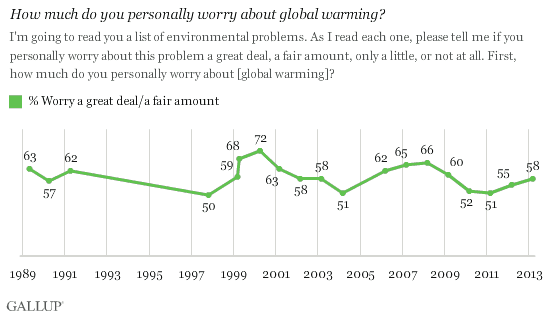
More specifically, 33% of Americans worry about global warming "a great deal," 25% worry "a fair amount," 20% "only a little," and 23% "not at all." Full trends are available in the Survey Methods section.
Public concern about global warming has waxed and waned over the past two decades, ranging between 50% and 72%. The average percentage over time for "worrying a great deal/fair amount" comes in at just under 60%, similar to the March 7-10 reading from Gallup's 2013 Environment poll.
The same poll finds 54% of Americans saying the effects of global warming have already begun. This also matches the average in Gallup trends on this measure since 1997. The low points were recorded in 1997 and 2011, when less than half thought global warming's effects were already manifest. The high point was recorded in 2008, at 61%. This year's percentage represents a slight increase from the lows reached just a couple of years ago.
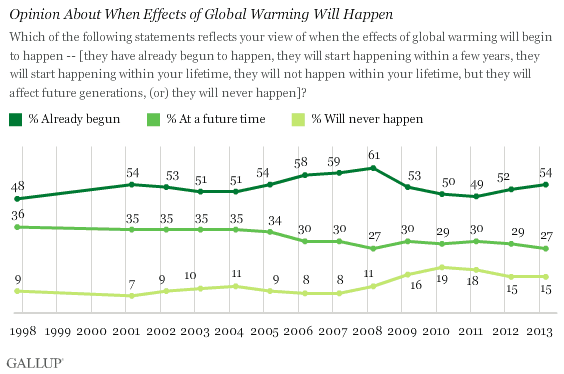
Americans continue to be less likely than in the recent past to believe news about global warming is generally exaggerated, with 41% saying so this year -- down from 48% in 2010, the all-time high. However, it remains above the long-term average of 36%.
The majority of Americans continue to believe news on the subject is either generally correct (24%) or underestimates the seriousness of the issue (33%).
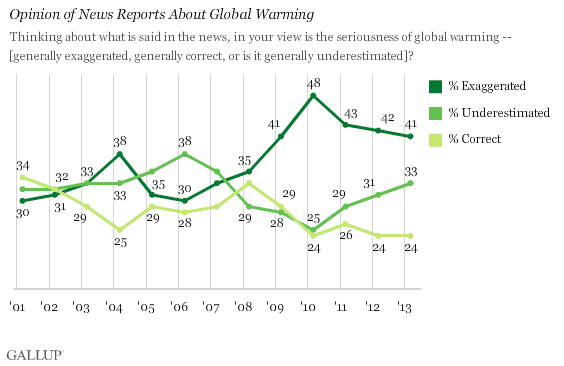
Belief in Scientist Consensus on Global Warming Back Above 60%
Americans this year are also more likely to believe that scientists agree global warming is occurring, mirroring the increase in worry about global warming since 2011. The 62% now saying so represents a nearly full return to pre-2010 attitudes.
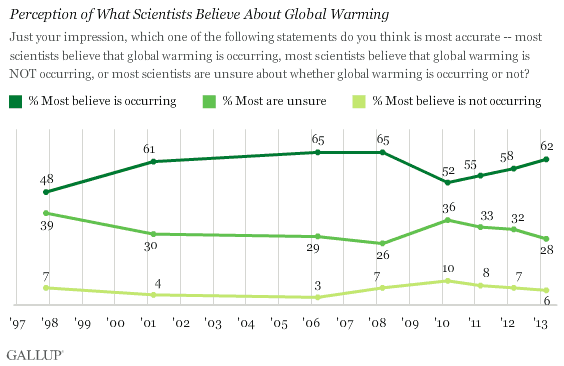
Similarly, fewer Americans today espouse global warming skeptics' view that the long-term increase in the Earth's average temperature is the result of natural changes in the environment, and not because of human activities. Currently, 57% of Americans say global warming is caused by human activities, up from 50% in 2010, although still slightly lower than the all-time high of 61%.
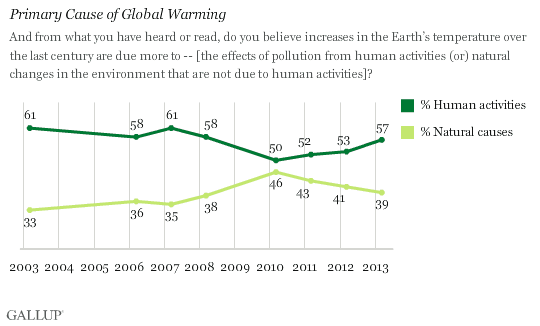
Despite Americans' general belief that global warming is under way and that scientists agree it is occurring, the majority do not believe global warming will pose a serious threat to them in their lifetime. The 34% who say it will matches the historical average since 1997. Thus, there has been no increase over time in the percentage of Americans who expect to be seriously affected.
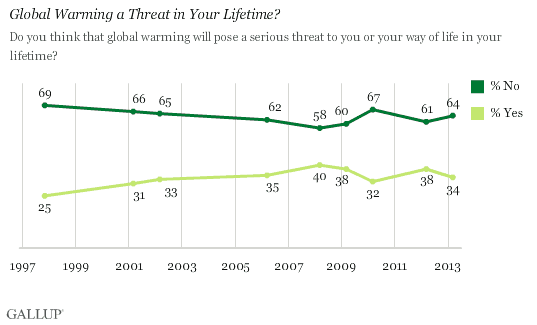
Bottom Line
Gallup trends throughout the past decade -- and some stretching back to 1989 -- have shown generally consistent majority support for the idea that global warming is real, that human activities cause it, and that news reports on it are correct, if not underestimated. However, those views have shown significant variability.
Americans' concerns about global warming peaked at points in the late 1980s and the late 1990s, and again between 2006 and 2008, possibly related to strong environmentalist campaigns to raise awareness of the issue at those times -- including the release of Al Gore's "An Inconvenient Truth" in 2006. Conversely, concerns receded in 2009 and 2010, particularly among Republicans and conservatives, corresponding with a flurry of publicity about scientists who doubt global warming is caused by human activities, as well as some controversy about global warming research. With all of this dying down somewhat in the last few years, attitudes are returning to previous levels, putting them near the long-term averages.
In contrast to majority acceptance of global warming as real, Gallup finds Americans less than alarmed. One-third worry "a great deal," and 34% expect it to threaten their way of life. These could be the attitudes that matter most when it comes to Americans' support for public policies designed to address the issue.
A forthcoming Gallup analysis will examine trends on attitudes toward global warming by partisanship.
Survey Methods
Results for this Gallup poll are based on telephone interviews conducted March 7-10, 2013, with a random sample of 1,022 adults, aged 18 and older, living in all 50 U.S. states and the District of Columbia.
For results based on the total sample of national adults, one can say with 95% confidence that the maxiumum margin of sampling error is ±4 percentage points.
Interviews are conducted with respondents on landline telephones and cellular phones, with interviews conducted in Spanish for respondents who are primarily Spanish-speaking. Each sample of national adults includes a minimum quota of 50% cellphone respondents and 50% landline respondents, with additional minimum quotas by region. Landline telephone numbers are chosen at random among listed telephone numbers. Cellphone numbers are selected using random-digit-dial methods. Landline respondents are chosen at random within each household on the basis of which member had the most recent birthday.
Samples are weighted to correct for unequal selection probability, nonresponse, and double coverage of landline and cell users in the two sampling frames. They are also weighted to match the national demographics of gender, age, race, Hispanic ethnicity, education, region, population density, and phone status (cellphone only/landline only/both, cellphone mostly, and having an unlisted landline number). Demographic weighting targets are based on the March 2012 Current Population Survey figures for the aged 18 and older U.S. population. Phone status targets are based on the July-December 2011 National Health Interview Survey. Population density targets are based on the 2010 census. All reported margins of sampling error include the computed design effects for weighting.
In addition to sampling error, question wording and practical difficulties in conducting surveys can introduce error or bias into the findings of public opinion polls.
View methodology, full question results, and trend data.
For more details on Gallup's polling methodology, visit https://www.gallup.com/.
